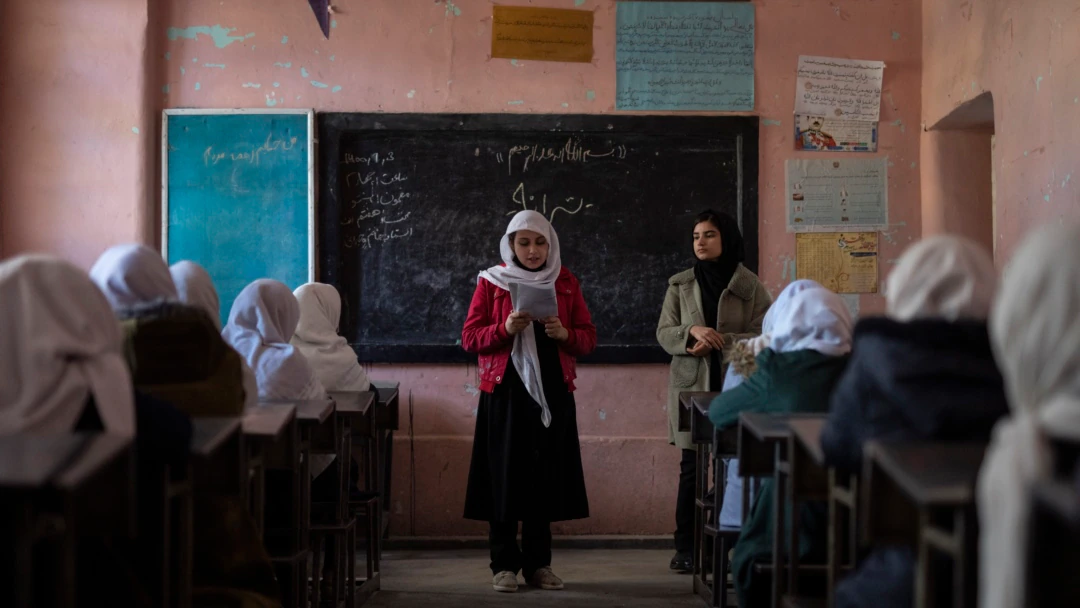

Acting Talibani appointed education minister of the Islamic Emirate of Afghanistan, Noorullah Munir said that the schools in the country were closed for girls due to ‘cultural constraints’, media reports said.
In the month of March, the Taliban administration in Afghanistan announced that girls’ high schools will be closed, hours after they reopened for the first time in nearly seven months. The backtracking by the Taliban led to female students above the sixth grade not being able to attend school.
Munir, during his visit to Khost province, stated that girls’ schools had been shut down due to cultural constraints. “People are not sensitive to the education of their girls, but to their girls leaving the house, and the culture of Afghans is quite sensitive in this area. You know better that the Islamic Emirate is attempting to reach an agreement with the people and start this process,” he said, reported Tolo News.
However, in stark contrast to what Munir said, the Taliban-appointed Deputy Minister of Education Sayed Ahmad Shahidkhail on Sunday noted that the delay in reopening girls’ schools was caused by problems in the curriculum for girls.
Munir denied these reports that the closure of the girls’ schools was caused by the change in the curriculum which suggests that even people inside of the so-called department are not on the same page. Munir said that the Afghan curriculum has issues and that there is currently no plan to change it.
“We have never said that we would begin working on the curriculum right away. Bringing changes to the curriculum is the right of every nation, people, and every government,” he stated.
“Three times work has been done on the available curriculum, still this issue has not been completed. God willing, we are responsible to our people over this issue, whether it is a man or a woman,” said Sayed Ahmad Shahidkhail.
Munir admits that more than 5,000 of the 20,000 schools in the country do not have buildings and need reconstruction and renovation, as per the media portal.
Earlier, the Taliban claimed that the closing of girls’ schools above sixth grade was “temporary” adding that it was not a “permanent ban.”
In an interview with CGTN TV, the spokesman of the Foreign Ministry, Abdul Qahar Balkhi said, “this suspension is a temporary suspension, and it is not a permanent ban, it has never been called a ban.”
Defending the Taliban, he said that the strict views of most Afghan people on the issue of education and women caused the girls’ schools to remain closed, reported Tolo News.
“There is a large percentage of society that has very strict ideas of what women can do and what they cannot do, and for that reason, the government is trying to take an approach that is gradual, it takes those people that do not understand some of the basic Islamic rights of Afghan citizens or of any human being, and the human rights, to try to convince them. It is due to lack of knowledge of that part of the society,” he said.
Balkhi added that they are trying to solve this problem.
Meanwhile, girls who have been prevented from going to school for more than eleven months are asking the Taliban to reopen schools for them, reported Tolo News.
“When women are not allowed to see a namhram, then who should treat a woman when she gets sick?” asked Fariha, a student.
“It is very disappointing and we ask the Islamic Emirate to reopen our schools,” said a student.
“If a government wants to have a progressive and developed society, there is no other way except with education and interaction with the community,” said Waheeda Adalatjo, a university lecturer.
It has been over 300 days since girls’ schools have been closed, Kabul’s officials have said that it depends upon the order of the leader of the Taliban.
The Taliban regime in Afghanistan has drawn heavy criticism across the world for a decree banning girls from school above grade sixth.